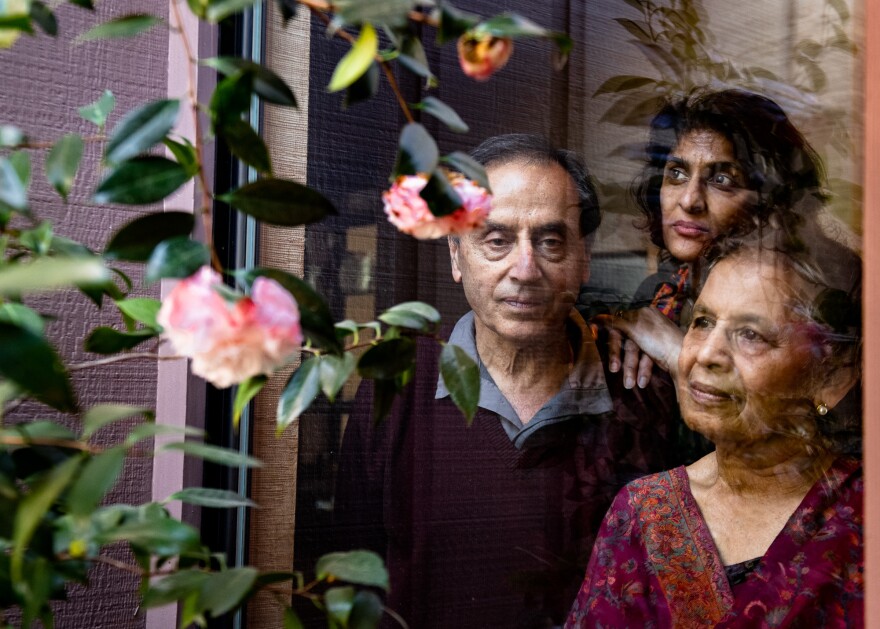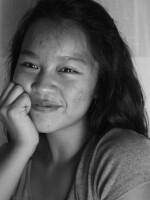Ashima Yadava's project Front Yard captures a moment in time where we all were seeking connection. In 2020, the pandemic gave Yadava the time to reflect, and so she looked to photography. She turned to her community, reaching out to her entire network, wanting to make portraits of them from their front yards, at a safe six-foot distance.
"I, just on a whim, sent an email to my entire network of neighbors and friends in the area, saying, 'I want to record this time that we're in. Can I please make a portrait of you?' " Yadava recalls.
"And because we had to keep a distance, I was, like, 'I'll do it across the street from your house, so can it be in your front yard?' And the first set of responses were brilliant. People were, like, 'Oh, yeah! We haven't seen a person in a month! Please, come on over!' "



Yadava's project was welcomed with enthusiasm and positivity by people who were excited to share their space with her. Families would come outside to set up. She would stand across the street with her large-format and digital cameras, ready to take their portraits.
As the project progressed, the work developed into a more personal reflection. She began to realize how this work helped her reclaim her relationship with the medium and her role as a photographer.
"I grew up in India. The one thing about documentary photography that had bothered me and that has made me feel a little weird about documentary photography [are] that power dynamics that come with photographing someone — it's your perspective: It's one perspective. It's a single story," Yadava said.
"The fact that I had this camera that was so slow, it allowed me the time to figure out my relationship with what I was doing and the people I was photographing."



"I would get the negative back and I started printing just to see and study if I'm doing it right, getting the colors right, and somewhere in that moment, I thought, 'Wait. What if I give this back to the people and continue this conversation about how they want to be seen? This is how I saw them, this is what it is, but how do they want to be seen and what do they have to say?' "
Thus began this collaboration of allowing those she'd photographed to become a part of the process. These black and white prints were suddenly brought to life by colors and drawings that these families would work on together.
"They would work on it as families — they would fight about it, they would talk about it, they would text me back and forth, 'Do you think we can do this?' It was truly a collaboration. It was something that saved all of us at that time, because I would enjoy that. I would be, like, 'Yes, do whatever you want!' "
Each family would contribute a unique perspective to their portraits and what emerged was a beautiful vignette of the different ethnicities that make up the Bay Area.



Yadava called it "inverting the process," where she, as the photographer, documented her observation and returned black and white prints to the families so that they could share their feelings through how they decided to fill in the image. Each family had a different perspective: Some filled their images with flowers on branches, and others covered their walls with spiders. The results that emerged were always a joy for Yadava to discover.
Our homes were a sacred place during the pandemic, and these families welcomed Yadava to capture a glimpse into their realities. It was created during a time of tragedy and disconnect, but lives on as a record of time.
Since then, Yadava has continued the series and plans to release a book. Her decision to expand the project in a post-COVID world was ignited by the joyful exchange with families and how barriers between neighbors can come down. With this collaboration, Yadava hopes that people are reminded of the resilience in humanity and that we can find connections between us all if we open our worlds up to it.

Ashima Yadava is a conceptual documentary photographer and printmaker. She in based San Francisco, where she works in digital and analog methods. See more of Ashima's work on her website, AshimaYadava.com.
Photo edit by Grace Widyatmadja. Text edit by Zach Thompson.
Copyright 2024 NPR



